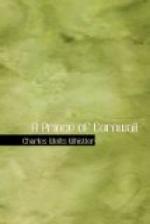I slept on it all, and woke with fewer fears on me, for I was overwrought yesterday after all the terrible waiting on the cliff and what went before. It was Sunday, moreover, and the early services in the new church helped mightily to set a new face on things. So when I had seen to the few duties of the morning, I went down the street to ask after Elfrida, being anxious to hear that her fright had done her no hurt. Erpwald had been there before me, but I had missed him since.
Elfrida was well, and glad to see me. We sat and talked of yesterday, and I found that Erpwald had said nothing of how he saved her, and it was pleasant to tell her of it, while she listened with eyes that sparkled. It was plain that I could have found nothing that would please her better than to talk of him. So I even told her how he had gone over the edge into the cleft, but without saying that we feared for his life for so long. Then her father came in, and at once she asked after some sick person.
“How goes it with him now,” she said.
“Well enough, says the leech; but he had well-nigh died in the night.”
“What is it that ails him?—Can the leech tell that yet?”
“He has taken somewhat that has poisoned him,” the ealdorman answered. “The leech asked if he had eaten of mushrooms, or rather toadstools, by mistake.”
“But there are none about as yet.”
Now I asked who the sick man was, and Herewald told me that he was such an one who was with us yesterday. I minded him as one who stood near me at the door when my horse reared. I thought that he was the man who picked up my dropped horn, and I was sorry for him. However, that was not much concern of mine, so we passed to other talk for a little, and then Elfrida said:
“Are there any tidings of my maiden? I fear for her.”
“None at all,” the ealdorman said. “Here is a strange thing, Oswald; for that girl whom you so nearly rode over last evening is as clean gone as if she had never been. None saw her go, but when supper time came she was nowhere to be found. Nor is there any trace of her now.”
I felt as if I had expected to hear that the Welsh girl had gone as well as the thrall, and I cannot say that I was surprised; though as they had failed in whatever they meant to compass this time, I could not see why they should not have tried again.
“Whence came she,” I asked as carelessly as I could. “Maybe she has only gone home, fearing blame for dropping that horn.”
“She has no home to go to, that we ken. She came from Jago at Norton only a little while ago, and she would hardly try to get back there across the hills alone. She is an orphan serf of his, and I fear that she has been stolen away.”
“She has not been here long, then?”
“She came when you were with Owen. Jago sent to ask if Elfrida would take her in, she being worth having as a maid. His wife had no place for her, but would that she was well cared for. So she came with the first chapman who travelled this way.”




